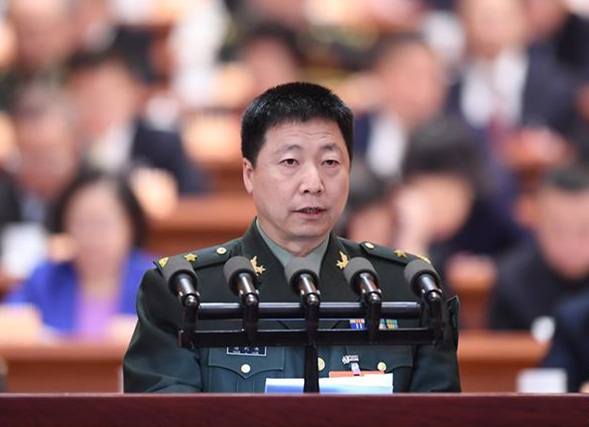?Chinese astronaut reveals struggles behind space missions
- By Zhang Rui
 0 Comment(s)
0 Comment(s) Print
Print E-mail China.org.cn, March 13, 2018
E-mail China.org.cn, March 13, 2018
Chinese astronaut Yang Liwei revealed some of the hardships behind the country's space missions at an annual session of the top political advisory body on Saturday in Beijing.

Yang, the nation's first astronaut and currently a top political advisor to the government, delivered a speech entitled "Achieving Dreams Relies on Struggle Without Fear of Sacrifice" on Saturday afternoon to members of the 13th National Committee of the Chinese People's Political Consultative Conference (CPPCC).
In 1998, the Chinese army established the astronaut brigade.
Behind the successful flights of Shenzhou 5 to Shenzhou 11 over the intervening 18 years, there were numerous struggles and sacrifices from astronauts as well as aerospace science and technology workers, Yang said.
Astronauts must first perform high-intensity training before entering space, Yang explained. During centrifuge training, astronauts rotate at a speed of 100 kilometers per hour. As a result, their faces are temporarily stretched and deformed, tears flow involuntarily, eyesight is impaired and there may even be a life-threatening loss of consciousness.
But even the arduous simulations could not prepare Yang for the real thing. On the morning of Oct. 15, 2003, Shenzhou 5 was launched.
As the rocket accelerated, the turbulence of the space vehicle caused the astronaut's internal organs to vibrate, which did not occur in previous simulations. At the time, Yang felt that his organs must have been damaged.
"I am afraid I'm going to die," he recalled thinking. After 26 seconds of turbulence, the spacecraft finally exited the atmosphere. Yang said he remembered hearing someone at ground control shout, "You see, he is still alive!"
Yang noted that this spirit of sacrifice is reflected in other astronauts as well, such as Nie Haisheng. On the eve of the Shenzhou 7 mission, Nie's mother had a cerebral hemorrhage, leaving her unable to speak. Though the astronaut felt guilty for leaving his mother in order to take part in the flight, Nie's brother told him, "You go on carrying out your mission without worry. We are brothers - one for the country, one for the family!"
Astronauts Zhai Zhigang and Liu Boming also faced their own challenges during the Shenzhou 7 mission, Yang revealed. The two had technical problems onboard the ship, including difficulties opening the hatch in order to enter and exit the spacecraft. Despite the potential danger to themselves, Zhai and Liu decided to proceed with the mission so that the Chinese flag could be seen in space. In the end, they completed their mission and returned home safely.
Yang's speech received applause from members attending the first session of the CPPCC, which closes on March 15.





